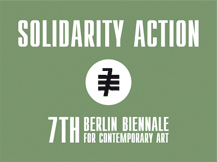My work relies economically on institutions that, in turn, are controlled by political factors that establish their funding. The first message of any work created under these conditions (whether its content is political or not) is a tribute to the institution that exhibits it, an implicit legitimizing that institutions functioning and orientation, as well as of the political power that authorizes it. Open rejection of this role means bad manners, or makes you run the risk of isolation.
• In history, it has been seen that artistic innovation tends to flourish, to a great extent, where economic liberalism is most inventive and uncontrolled.
• The status of the artist is based on social conditions neoliberalism would like to offer to workers as a whole. Besides a near total lack of social guarantees, this hypercompetitive system produces a situation of general submission to the system, while the interchangeable character and isolation of individual subjects prevent them from forming themselves into a political force, even simply to attempt forms of corporative struggle.
• If I am forced to orient my production between a luxury product for collectors and an accessory with a social function that is justifiable in terms of public expenditure, the control I have over its political and social role decreases in proportion to the acclaim it is able to gain. Starting with this observation, it seems out of place to expect an explicitly political commitment from the content of my work, without running the risk of seeing it as a mere motive or alibi. It is in its peripheral aspects and practice that it is still possible to proceed for the widening and renewal of the habitual art audience, getting out of the physical spaces of the institution to approach those persons who do not visit it.
It is also possible to break the isolation and to challenge the logic of competition, developing projects with other artists, with or without institutional support, that are evaluated by a commission. Getting beyond individualism means starting to exist, politically, in a form of solidarity capable of opposing the ultraliberal dictates that usually govern the art world.
Reassessment of the relationship with the audience and redefinition of the relationships among artists, beyond the contents of the works, seem to indicate a realistic, effective and accessible field of political action. These are two lines I have taken in recent years, regularly working with other artists capable of getting out of the circuit of the usual exhibition spaces.
LAURENT FAULON
Artist. Lives and works at the Istituto Svizzero di Roma.


